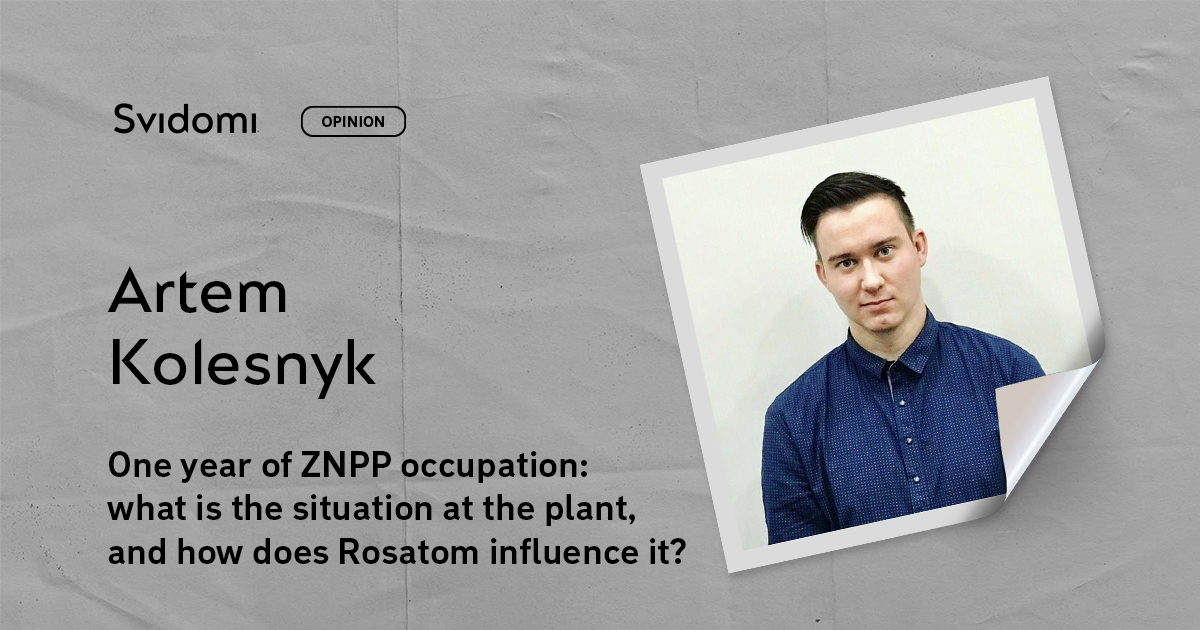One year of ZNPP occupation: what is the situation at the plant, and how does Rosatom influence it?

On the night of March 4, 2022, Russian troops seized the Zaporizhzhia Nuclear Power Plant, Europe's largest nuclear power plant consisting of six power units, which, before the full-scale offensive, supplied a fifth of Ukraine's electricity.
Throughout the year, Russian shells flew dangerously close to the reactors. As a result, the plant repeatedly lost the external power necessary to maintain regular operation. In addition, there is evidence of pressure, torture and abductions of plant employees and the deployment of missile systems and weapons on its territory.
Today, ZNPP remains under occupation, with all six reactors shut down and electricity still supplied from the last four backup power lines.
Moreover, there is evidence that the Russian nuclear corporation Rosatom is involved in the occupation of the plant. In particular, employees were forced to sign new contracts with the company, and if they refused, they were not allowed to work, which led to a shortage of qualified personnel.
In addition, the Security Service of Ukraine reports that it has evidence that Rosatom has taken control of management and technological processes at the plant and is facilitating its connection to the Russian power grid.
Despite its involvement in nuclear terrorism, Rosatom is still not under sanctions and retains influence over the global nuclear industry. The company has the world's most extensive portfolio of overseas projects, building 36 power units worldwide. Rosatom is also the world leader in uranium enrichment (36% of the market) and fuels every sixth reactor globally.
The corporation has production facilities in the EU. In addition, it cooperates with several French, German and Finnish companies, and Russia remains a member of international organisations in the "peaceful use of the atom." In particular, Russians are present in the leadership of the International Atomic Energy Agency (IAEA), and IAEA Deputy Director General Mikhail Chudakov even worked for Rosatom.
"Rosatom also influenced the Ukrainian nuclear industry, as all Ukrainian nuclear power units are Soviet-era and run on Russian nuclear fuel. Since the beginning of the war in 2014, the Ukrainian nuclear enterprise Energoatom has been gradually converting its reactors to American fuel from Westinghouse.
Currently, only 7 of the 15 power units at Ukrainian NPPs can operate entirely without Russian fuel. The rest are still running on Russian nuclear fuel stocks purchased earlier. Ukraine could only abandon storing and reprocessing spent nuclear fuel in Russia in April 2022. Previously, they had paid Russia $200 million annually for this service.
So, while the world is in no hurry to eliminate nuclear dependence on Russia, the aggressor country continues nuclear terrorism. Ukraine has to keep its energy system afloat in the new environment.
Dependence on sizeable centralised energy sources has proven to be unreliable. Therefore, the state has started talking about decentralising the energy system and gradually switching to safer renewable energy in the post-war reconstruction. However, there are still plans to develop nuclear energy.


